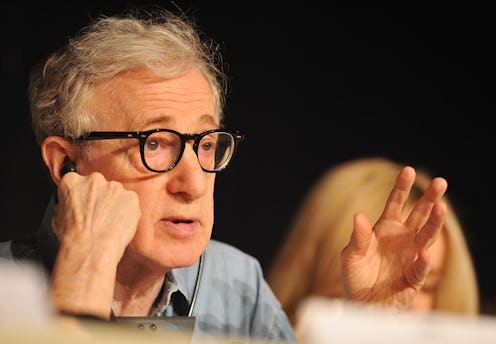Entertainment
The Academy Doesn't Know How to Handle Abusers
In the wake of Woody Allen's awkward reception of the Cecil B. DeMille Award at the 2014 Golden Globes, many people questioned their love for the work of a director who's been accused of sexually assaulting his 7-year-old stepdaughter. That sentiment reemerged this morning when the Oscar nominations revealed 19 nominations for Allen, as well as several nominations of Michael Fassbender, whose ex-girlfriend filed a restraining order against him after horrific allegations of abuse. But the important questions surrounding these nominations isn't whether or not we should continue enjoying the work of the nominees, but rather, how these nominations should be given out in the first place.
Inevitably, when issues like these are brought up, Roman Polanski is mentioned. The situation is eerily similar: Polanski won the Oscar for Best Director for The Pianist in 2002, years after he had settled out of court with the young lady who accused him of sexual assault. And like Allen, when Polanski could not accept the award due to fleeing the country after being charged with rape, the elephant in the room became that much harder to ignore.
Yet people continue to defend and even to advocate for Polanski receiving the award, and for sound reasons. As the director of Rosemary's Baby and Chinatown, Polanski's recognition was long overdue. And the conscience of Oscar voters and audiences was cleared when Polanski's accuser, Samantha Grier, appeared on television and in the newspaper to publicly forgive him, saying "I believe that Mr. Polanski and his film should be honored according to the quality of the work. What he does for a living and how good he is at it have nothing to do with me or what he did to me. I don't think it would be fair to take past events into consideration."
While Grier certainly spoke well for her experience, and the voters were right to follow her lead, awards shows seem to be continuing to take this attitude of forgetting the past without the victim's forgiveness. As much as the Academy wants to forget and move on, awards shows don't live in a vacuum. Seeing someone who's been publicly accused as an abuser showered with accolades is not only hard for the victim, but it's also hard to watch for other victims of rape and abuse who are reminded how easy it is for their abusers to walk free.
And unlike Polanski, these men have not been forgiven. Fassbender's ex, Sunawin Andrews, has not been heard from again. Dylan Farrow, Allen's step-daughter, has told Vanity Fair that she has no plans to repair her relationship with Allen, and her mother Mia and brother Ronan both publicly denounced his Golden Globe win over Twitter.
But the issue is far from cut and dry. If these were any other awards given for any other profession, this wouldn't be an issue. A person's work can certainly be separate from their personal life, or even their criminal record. But these are both nationally televised awards shows, so in giving these awards, these shows unintentionally make a public statement about how much concern Hollywood has for victims of rape and abuse.
Allen, Fassbender, and Polanski are all undisputed masters of their craft, certainly deserving of these awards. But should these awards be given to them so easily? Should they be given at all? Should some kind of outreach given to victims or public announcement be made in tandem with these nominations?
It's unlikely that the Globes or the Oscars will even consider these kinds of questions in their nominations. But in nominating people who have been accused of abuse without putting any further thought into it, these award shows send a message that serious transgressions against another human being can be ignored as long as your work is respected enough.
Giving these public awards without comment allows everyone to forgive and forget, except for the one group of people who need to: the victims of abuse.
